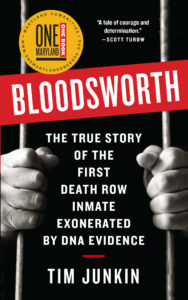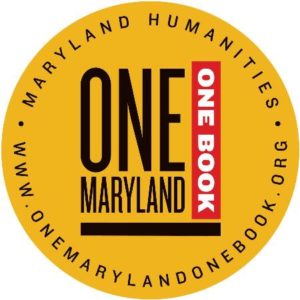True Crime Story of First Death Row Inmate Saved by DNA is 2018 One Maryland One Book
(Baltimore) – Maryland Humanities is pleased to announce the selection of Bloodsworth: The True Story of the First Death Row Inmate Exonerated by DNA by Maryland native Tim Junkin for the 2018 One Maryland One Book program. The book was chosen by a committee of librarians, educators, authors, and bibliophiles in February from more than 209 titles suggested last fall by readers across the state under the theme, “Justice.”
“One Maryland One Book brings together a wide range of residents from every corner of the state,” says Phoebe Stein, Executive Director at Maryland Humanities. “Selecting a compelling book that centers on a Maryland native, written by a local author, adds an exciting layer to the program. I’m looking forward to hearing the important discussions this book will generate.”
Tim Junkin says: “I was honored to learn that Bloodsworth was chosen as the 2018 One Maryland One Book selection, a program I applaud for encouraging reading and dialogue throughout our state. I was delighted, as well, to be a finalist in the company of such remarkable books as Bryan Stevenson’s Just Mercy and Jesmyn Ward’s Sing, Unburied Sing, both of which are marvels,” the author continued. “The marvel of Kirk Bloodsworth is that he not only survived, but what he became. His ordeal is still, to me, a frightening reminder of hard truths leavened with astonishing miracles.”
About the Book
 Charged with the rape and murder of a nine-year-old girl in 1984, Kirk Bloodsworth was tried, convicted, and sentenced to die in Maryland’s gas chamber. Maintaining his innocence, he read everything on criminal law available in the prison library and persuaded a new lawyer to petition for the then-innovative DNA testing. After nine years in one of the harshest prisons in America, Kirk Bloodsworth became the first death row inmate exonerated by DNA evidence. He was pardoned by the governor of Maryland and has gone on to become a tireless spokesman against capital punishment. Bloodsworth’s story speaks for hundreds of others who were wrongly convicted and have since been released, and for the thousands still in prison waiting for DNA testing.
Charged with the rape and murder of a nine-year-old girl in 1984, Kirk Bloodsworth was tried, convicted, and sentenced to die in Maryland’s gas chamber. Maintaining his innocence, he read everything on criminal law available in the prison library and persuaded a new lawyer to petition for the then-innovative DNA testing. After nine years in one of the harshest prisons in America, Kirk Bloodsworth became the first death row inmate exonerated by DNA evidence. He was pardoned by the governor of Maryland and has gone on to become a tireless spokesman against capital punishment. Bloodsworth’s story speaks for hundreds of others who were wrongly convicted and have since been released, and for the thousands still in prison waiting for DNA testing.
About the Author
 Tim Junkin is an attorney with thirty years of experience as a trial lawyer and advocate of civil rights, an award-winning writer, and a teacher. He spent much of his boyhood in Talbot County, graduating from Easton High School. Today he lives on the Wye River on Maryland’s Eastern Shore. Junkin is the author of The Waterman, Good Counsel, and Bloodsworth. He also founded Midshore Riverkeeper Conservancy which became ShoreRivers, a Maryland river protection nonprofit, and has received several environmental awards. He graduated from the University of Maryland in 1973 and completed his law studies at Georgetown University Law Center in 1977. He has taught at American University, Georgetown University Law Center, Harvard University Law School, and the Bethesda Writer’s Center.
Tim Junkin is an attorney with thirty years of experience as a trial lawyer and advocate of civil rights, an award-winning writer, and a teacher. He spent much of his boyhood in Talbot County, graduating from Easton High School. Today he lives on the Wye River on Maryland’s Eastern Shore. Junkin is the author of The Waterman, Good Counsel, and Bloodsworth. He also founded Midshore Riverkeeper Conservancy which became ShoreRivers, a Maryland river protection nonprofit, and has received several environmental awards. He graduated from the University of Maryland in 1973 and completed his law studies at Georgetown University Law Center in 1977. He has taught at American University, Georgetown University Law Center, Harvard University Law School, and the Bethesda Writer’s Center.
About One Maryland One Book

When we read a great book, we can’t wait to share the experience and talk about it with others. That’s one of the joys of reading.
In that spirit, through its Maryland Center for the Book program, Maryland Humanities created One Maryland One Book (OMOB) to bring together diverse people in communities across the state through the shared experience of reading the same book. We invite readers to participate in book-centered discussions and related programs at public libraries, high schools, colleges, museums, bookstores, and community and senior centers around the state.
OMOB programs, including an author tour, take place each year in the fall. A calendar of free public events will be available online beginning this summer.
Want to discuss the book now or get updates on upcoming events? Join the conversation on the Maryland Center for the Book Facebook page. Connect with Maryland Humanities on Facebook, Twitter, and Instagram.
One Maryland One Book is presented in partnership with Enoch Pratt Free Library and is sponsored by The Institute of Museum and Library Services via the Maryland State Library as well as BGE, with additional support from PNC Foundation, Baltimore City Foundation, Wells Fargo, and M&T Bank.

